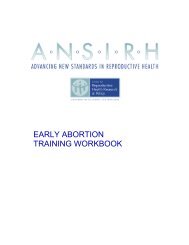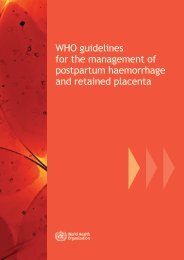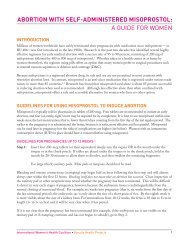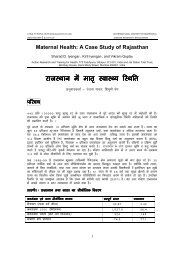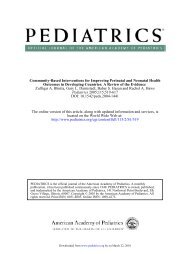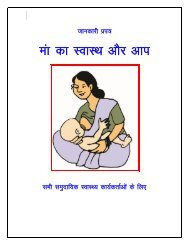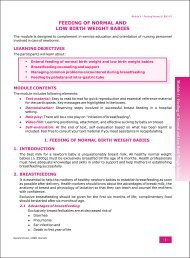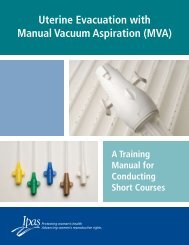- Page 2: Collaborating and Supporting Organi
- Page 6: Family PlanningA GLOBAL HANDBOOK FO
- Page 10: ForewordsFrom the World Health Orga
- Page 14: AcknowledgementsVera Zlidar, Ushma
- Page 18: What’s New inThis Handbook?This n
- Page 22: How to Obtain More Copiesof This Bo
- Page 26: xii
- Page 30: óóAs commonly used, about 8 pregn
- Page 36: Who Can and Cannot UseCombined Oral
- Page 40: 5. Do you have high blood pressure?
- Page 44: Using Clinical Judgment in Special
- Page 48: Woman’s situationFully or nearly
- Page 52: Giving Advice on Side EffectsIMPORT
- Page 56: Supporting the UserManaging Missed
- Page 60: Managing Any ProblemsProblems Repor
- Page 64: óóóóóóóóóóóóBreast tend
- Page 68: Extended and Continuous Use ofCombi
- Page 72: 7. Do COCs change women’s mood or
- Page 76: CHAPTER 2Progestin-Only PillsThis c
- Page 80: Side Effects, Health Benefits, and
- Page 84:
Medical Eligibility Criteria forPro
- Page 88:
Providing Progestin-Only PillsWhen
- Page 92:
Woman’s situationHaving menstrual
- Page 96:
Explaining How to Use1. Give pills
- Page 100:
Planning the Next Visit1.2.Encourag
- Page 104:
óóóóóóóóóóóprovide some
- Page 108:
New Problems That May Require Switc
- Page 112:
5. If a woman does not have monthly
- Page 116:
CHAPTER 3EmergencyContraceptive Pil
- Page 120:
Return of fertility after taking EC
- Page 124:
Providing EmergencyContraceptive Pi
- Page 128:
3. Explain what ó Nausea:to do abo
- Page 132:
MethodMale and femalecondoms,spermi
- Page 136:
6. Are ECPs safe for women with HIV
- Page 142:
Hormoneand PillTypeCombined(estroge
- Page 146:
óóGiven by injection into the mus
- Page 150:
Known Health BenefitsDMPAHelps prot
- Page 154:
Who Can and Cannot UseProgestin-Onl
- Page 158:
Medical Eligibility Criteria for Pr
- Page 162:
Providing Progestin-OnlyInjectables
- Page 166:
Woman’s situationNot breastfeedin
- Page 170:
3. Prepare vial ó DMPA: Gently sha
- Page 174:
Helping Continuing UsersRepeat Inje
- Page 178:
Heavy or prolonged bleeding (twice
- Page 182:
Questions and Answers AboutProgesti
- Page 186:
9. Can a woman switch from one prog
- Page 190:
How Effective?Effectiveness depends
- Page 194:
Who Can and Cannot UseMonthly Injec
- Page 198:
Medical Eligibility Criteria for Mo
- Page 202:
Using Clinical Judgment in Special
- Page 206:
Woman’s situationFully or nearly
- Page 210:
Giving the Injection1. Obtain one
- Page 214:
Planning the Next Injection1. Agree
- Page 218:
óóóóóóóóóóóóHeavy or pr
- Page 222:
Questions and Answers AboutMonthly
- Page 226:
8. Do monthly injectables change wo
- Page 230:
óPregnancy rates may be slightly h
- Page 234:
Supporting the UserInstructions for
- Page 238:
How Effective?Effectiveness depends
- Page 242:
Supporting the UserInstructions for
- Page 246:
How Effective?One of the most effec
- Page 250:
ComplicationsUncommon:óóInfection
- Page 254:
Medical Eligibility Criteria forImp
- Page 258:
Providing ImplantsWhen to StartIMPO
- Page 262:
Woman’s situationNot breastfeedin
- Page 266:
Inserting ImplantsExplaining the In
- Page 270:
Supporting the UserGiving Specific
- Page 274:
Managing Any ProblemsProblems Repor
- Page 278:
óóóóóóóóóóóóóóóóóN
- Page 282:
óóóóóóóóóMigraine headache
- Page 286:
8. Do implants change women’s moo
- Page 290:
óStudies have found that the TCu-3
- Page 294:
Who Can and Cannot Use theCopper-Be
- Page 298:
Medical Eligibility Criteria for Co
- Page 302:
Intrauterine Devices for Women With
- Page 306:
Providing theIntrauterine DeviceWhe
- Page 310:
Woman’s situationFor emergencycon
- Page 314:
Explaining the Insertion ProcedureA
- Page 318:
Follow-up visitóA follow-up visit
- Page 322:
Switching From an IUD to Another Me
- Page 326:
óóóóóFor modest short-term rel
- Page 330:
óóóóóóSevere pain in lower ab
- Page 334:
óóóIf the woman does not want to
- Page 338:
8. Should antibiotics be routinely
- Page 342:
How Effective?One of the most effec
- Page 346:
Who Can and Cannot UseLevonorgestre
- Page 350:
Woman’s situationSwitching froma
- Page 354:
Giving Advice on Side EffectsIMPORT
- Page 358:
óóA small risk of pregnancy remai
- Page 362:
Why Some Women Say They LikeFemale
- Page 366:
Medical Eligibility Criteria for Fe
- Page 370:
Providing Female SterilizationWhen
- Page 374:
Because Sterilization Is PermanentA
- Page 378:
5.6.7.8.9.The provider makes a smal
- Page 382:
“Come Back Any Time”: Reasons t
- Page 386:
Questions and Answers AboutFemale S
- Page 390:
10. How can health care providers h
- Page 394:
óóóVasectomy is not fully effect
- Page 398:
Who Can Have a VasectomySafe for Al
- Page 402:
Medical Eligibility Criteria for Va
- Page 406:
Vasectomy TechniquesReaching the Va
- Page 410:
Supporting the UserExplaining Self-
- Page 414:
Helping UsersManaging Any ProblemsP
- Page 418:
4. Is it possible to check if a vas
- Page 424:
CHAPTER 13Male CondomsThis chapter
- Page 428:
Why Some Men and Women Say They Lik
- Page 432:
Explaining How to UseIMPORTANT: Whe
- Page 436:
What Condom Users Should Not DoSome
- Page 440:
infection, a mutually faithful sexu
- Page 444:
4. Will using condoms reduce the ri
- Page 448:
CHAPTER 14Female CondomsThis chapte
- Page 452:
Side Effects, Health Benefits, and
- Page 456:
Basic StepsImportant Details3. Ensu
- Page 460:
Tips for New UsersóóóóSuggest t
- Page 464:
óóóóóMild irritation in or aro
- Page 468:
CHAPTER 15Spermicides andDiaphragms
- Page 472:
Correcting Misunderstandings (see a
- Page 476:
Supporting the Spermicide UserEnsur
- Page 480:
Correcting Misunderstandings (see a
- Page 484:
Providing DiaphragmsWhen to StartWo
- Page 488:
Basic Steps Important Details4. Kee
- Page 492:
Managing Any ProblemsProblems Repor
- Page 496:
Questions and Answers AboutSpermici
- Page 500:
CHAPTER 16Cervical CapsKey Points f
- Page 504:
CHAPTER 17Fertility AwarenessMethod
- Page 508:
Side Effects, Health Benefits, and
- Page 512:
Providing Calendar-BasedMethodsWhen
- Page 516:
Calendar Rhythm MethodKeep track of
- Page 520:
(including chlorpromazine, thiorida
- Page 524:
Basal Body Temperature (BBT) Method
- Page 528:
Symptothermal Method (basal body te
- Page 532:
óIf she has had unprotected sex in
- Page 536:
CHAPTER 18WithdrawalKey Points for
- Page 540:
CHAPTER 19LactationalAmenorrhea Met
- Page 544:
Who Can Use the LactationalAmenorrh
- Page 548:
Providing the LactationalAmenorrhea
- Page 552:
Explaining How to UseBreastfeed oft
- Page 556:
Questions and Answers Aboutthe Lact
- Page 560:
CHAPTER 20Serving DiverseGroupsKey
- Page 564:
For some contraceptive methods ther
- Page 568:
Provide Accurate InformationTo info
- Page 572:
Female sterilization and vasectomy
- Page 576:
Family planning providers can help
- Page 580:
What Causes STIs?Several types of o
- Page 584:
Common signs and symptoms that may
- Page 588:
Strategy 3: If both partners know t
- Page 592:
MethodFemalesterilizationVasectomyS
- Page 596:
Screening and TreatmentScreening fo
- Page 600:
6. Will having sex with a virgin cu
- Page 604:
CHAPTER 22Maternal andNewborn Healt
- Page 608:
óóóA woman who is not fully or n
- Page 612:
Earliest Time That a Woman Can Star
- Page 616:
- To destroy HIV in breast milk, ex
- Page 620:
CHAPTER 23ReproductiveHealth Issues
- Page 624:
When to Start Contraceptive Methods
- Page 628:
3.Be alert to symptoms, injuries, o
- Page 632:
6.óóIf she wants, give her a cont
- Page 636:
Postpartum and postabortion infecti
- Page 640:
CHAPTER 24Family PlanningProvisionI
- Page 644:
óóCheck the client’s understand
- Page 648:
MethodMonthly andprogestin-onlyinje
- Page 652:
Wear glovesDo pelvicexaminationsonl
- Page 656:
Make Infection Prevention a HabitWi
- Page 660:
Regularly (monthly or quarterly, de
- Page 664:
APPENDIX AContraceptive Effectivene
- Page 668:
Condition Description Signs and Sym
- Page 672:
Cardiovascular DiseaseóóóóHigh
- Page 676:
ConditionCombined oralcontraceptive
- Page 680:
= Use the method= Do not use the me
- Page 684:
= Use the method= Do not use the me
- Page 688:
= Use the method= Do not use the me
- Page 692:
hernia; postpartum uterine rupture
- Page 696:
Glossaryabscess A pocket of pus sur
- Page 700:
endometrial cancer Malignant (cance
- Page 704:
jaundice Abnormal yellowing of the
- Page 708:
scrotum The pouch of skin behind th
- Page 712:
Aabdominal bloating and discomfort.
- Page 716:
community-based distribution...317c
- Page 720:
genital warts...279, 284-285gloves.
- Page 724:
lubricants...274for female condoms.
- Page 728:
post-exposure prophylaxis...209, 28
- Page 732:
unexplained vaginal bleeding...40,
- Page 736:
MethodologyThis handbook, one of th
- Page 740:
p. 250 Institute for Reproductive H
- Page 744:
Comparing InjectablesCharacteristic
- Page 748:
Characteristic Male Condoms Female
- Page 752:
Correctly Using a Male Condom1. Use
- Page 756:
External AnatomyClitorisSensitive b
- Page 760:
Male Anatomyand How Contraceptives
- Page 764:
Identifying Migraine HeadachesFor w
- Page 768:
When she returns:óóIf she returns
- Page 772:
If You Miss PillsAlways take a pill



